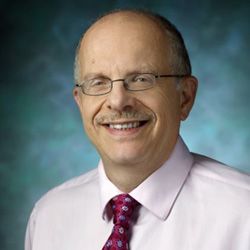
Vsevolod (Seva) Polotsky, MD, PhD
Vsevolod (Seva) Polotsky, MD, PhD is Tenured Professor and Vice Chair for Research in the Department of Anesthesiology and Critical Care Medicine at the George Washington University School of Medicine and Health Science. Dr. Polotsky relocated to the GWU in December of 2022 to build a new translational research program. Prior to that he was on faculty of the Johns Hopkins University School of Medicine for more than two decades rising through the ranks from Instructor to full Professor. Upon his graduation from a medical school in Saint Petersburg, Russia with MD and PhD degrees, Dr. Polotsky moved to the USA, where he received postdoctoral research training in molecular biology and biochemistry at the NIH and Yale University, completed Internal Medicine Residency at Norwalk Hospital in Connecticut, and Pulmonary, Critical Care and Sleep Medicine Fellowships at the Johns Hopkins University. Dr. Polotsky’s entire career has been dedicated to extensive studies of the pathogenesis and consequences of sleep disordered breathing. He has developed several mouse models of sleep disordered breathing and published pioneering work showing that chronic intermittent hypoxia, a hallmark manifestation of sleep apnea, causes atherosclerosis, non-alcoholic steatohepatitis, insulin resistance and glucose tolerance. Dr. Polotsky is an expert on hormonal regulation of breathing. He has published numerous widely cited papers elucidating the role of leptin in control of breathing. Dr. Polotsky’s research efforts were continuously funded by the NIH since 2002. Recently, he became involved in the development of novel treatments of opioid-induced respiratory depression. Polotsky has published over 159 papers in prestigious, peer-reviewed journals. His h-index is 62. Dr. Polotsky served on multiple NIH study sections, and he is an Associate Editor of the Journal of Neurophysiology and a member of the editorial boards of several journals, including Frontiers, the American Journal of Respiratory and Critical Care Medicine, the Journal of Applied Physiology and the European Respiratory Journal.
Polotsky has been active internationally in professional societies, having served as the Chair of the Sleep and Respiratory Neurobiology Assembly, and as a member of advocacy committees influencing public policy in sleep disorders. He has trained multiple physician-scientists who hold faculty positions in the top U.S. medical schools as well as at academic institutions around the world.

Shannon Fonti, Lab Manager
Shannon has worked with the Polotsky lab since 2005. She is a broadly skilled and highly productive Research Scientist with over 20 years of experience in both pre-clinical and clinical science. She has a diversified skill set including experience in laboratory management and maintenance, molecular biology, cell biology and biochemistry techniques, as well as, broad experience with clinical trials, including management, regulatory affairs, and data collection. She also has an extensive scientific publication record and professional certifications.
Outside of the lab, Shannon enjoys cooking and spending time with her family.

Mi-Kyung Shin, PhD, Research Scientist
Dr. Shin has been part of the Polotsky laboratory since 2010, with a research interest in obesity induced hypertension and metabolism through the sympathetic nervous system - especially, the carotid body (CB). She has performed pioneering studies using carotid sinus nerve denervation to elucidate the role of the CB in regulating metabolism, breathing, and hemodynamics; studies on the role of leptin and hypoxia on metabolism and obesity. She has also found that the Transient receptor potential melastatin 7 (Trpm7) channel and leptin receptor (LepR) in CB plays a role in obesity induced hypertension, and, she has now examined that in CB and also implicated in intermittent hypoxia induced hypertension. She has a well-deserved reputation as an outstanding animal surgeon and molecular biologist.
In her free time, Mi-Kyung enjoys spending time with her church community and going fishing with her friends.
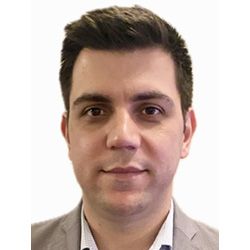
Mateus Ramos Amorim, PhD, Research Assistant Professor
Dr. Amorim joined the Polotsky lab in 2019. He has a strong background in integrative physiology with special attention to the neural control of cardiovascular and respiratory systems during sleep. Dr. Amorim is using several experimental approaches such as stereotactic administration of viral vectors to the brain and sleep study data acquisition and analysis. His most recent research focuses on the role of metabolic pathways in the pathogenesis of sleep disordered breathing, especially leptin and melanocortin 4 receptor, which is downstream of leptin signaling.
During his free time, he goes out with his family to visit new places, as well as prepare and enjoy a good barbecue.

Arijit Roy, PhD, Research Scientist
Dr. Arijit Roy joined the Polotsky lab in 2022. He is an expert in carotid body (CB) physiology. His research career spans over a period of two decades; focusing on the control of CB chemosensitivity to mitigate diseases including asthma, sleep apnea, obesity and hypertension. Roy received his PhD in Cryo-Tumor Immunology from Calcutta University in India. He started his Postdoctoral career under the late Prof. Sukhamay Lahiri at the University of Pennsylvania, where he developed a novel ex-vivo CB preparation, a gold standard technique to study the CB chemosensitivity. Later, Roy joined the University of Calgary, and further investigated the impact of CB on autonomic nervous system mediated diseases.
Besides his passion for research, he loves to sing, enjoys photography, cooking, traveling, mentoring high school students on science projects and volunteering in the community.
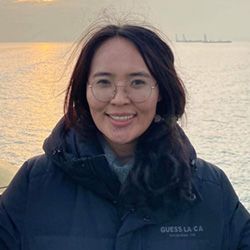
Dashdulam (Dashka) Davaanyam, PhD, Postdoctoral Researcher
Dr. Davaanyam joined the Polotsky lab is 2024. She is a dedicated researcher and medical professional with a background in anatomy, pathology, and neuroscience. Fluent in both Mongolian and Korean, she’s had the privilege of contributing to various research projects and academic pursuits. During her roles as a Post-Doctoral Researcher at institutions like Inha University and Ewha Woman’s University, she had the opportunity to delve into neuroinflammation and neurobiology contributing to scientific literature on topics such as neuroprotection and cellular mechanisms underlying diseases.
In her free time, she enjoys embracing new experiences, whether it's trying new foods, exploring unfamiliar places, or immersing myself in different cultures. She finds solace in nature, cherishing moments of tranquility amidst the beauty of the outdoors.
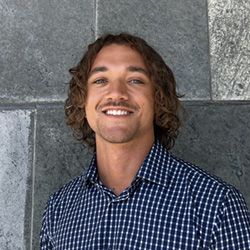
Noah Williams, Research Assistant
Noah joined the Polotsky lab in 2023. He has Bachelor’s degree in Nanomedicine from Virginia Polytechnic Institute and State University. Currently, the focus of Noah’s work in the Polotsky Lab is exploring possible pharmacotherapy for sleep disordered breathing. Some of his top skills include running sleep studies in mice, as well as, analyzing and interpreting sleep study data for the lab, and small animal stereotactic surgery.
In his free time, Noah enjoys researching the statistics underlying sports and cooking new recipes.
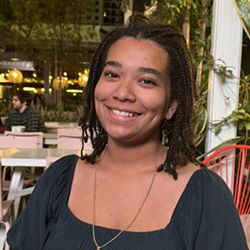
Melanie Alexis-Ruiz, Research Assistant
Melanie joined the Polotsky lab in 2024. She is originally from Brussels, Belgium and moved to the US in 2016. She has a bachelor's degree in Biological Sciences from Florida International University. In the Polotsky lab, Melanie evaluates the control of breathing in experimental animals performing hypoxic and hypercapnic ventilatory response testing, as well as, assisting in stereotactic surgery. Her research interests revolve around targeted therapy and developing new therapeutic treatments to minimize side effects on patients.
Outside of the lab, Melanie enjoys traveling, going on walks, reading and spending time with friends and family.
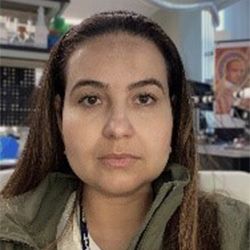
Junia Lara de Deus, PhD, Consultant
Dr. de Deus joined the Polotsky lab in 2024 as a consultant. She has a strong background in neurophysiology with special attention to electrophysiology and synaptic plasticity applied in different neural circuits. Some of her special skills include behavior, histology, small animal surgery and electrophysiological recordings. Currently, she is working with electrophysiological recordings from sleep studies.
In her free time, she enjoys her dog and outside activities. She also loves cooking and home decor.
- Former Lab Members
-

Jianguo (David) Li, MD, a Postdoctoral Fellow 2003-2008; Awarded with AHA Mid-Atlantic Affiliate Research Committee Fellowship, ‘The Impact of Intermittent Hypoxia on Hypercholesterolemia and Atherosclerosis’. Currently Senior Quality Assurance Engineer, Philips.
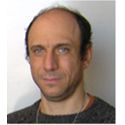
Vladimir Savransky, MD, PhD, a Research Associate 2005-2008; Awarded University of Maryland, Pilot and Feasibility Grant of the Clinical Nutrition Research Unit (DK72488), ‘Sleep Apnea and Lipid Metabolism in Obesity,’ (11/01/2005-10/30/2007). Currently a Principal Scientist, Emergent BioSolutions, Rockville, MD.

Jonathan Jun, MD, a Postdoctoral Fellow 2006-2011; Awarded American Lung Association-National Sleep Foundation Pickwick Fellowship, ‘Role of NADPH oxidase in Chronic Intermittent Hypoxia-Induced Atherosclerosis’, (2008-2010). Awarded Eudowood Board Baurenschmidt Fellowship, (2011-2012), Johns Hopkins Clinician Scientist Award (2011-2012), grant award P60DK079636 NIH/DRTC, (2011-2013), grant award NIH K08 HL109475, ‘Mechanisms and Consequences of Intermittent Hypoxia-Induced Lipolysis’, (2012-2017), and James B. Skatrud Young Investigator Award (ATS) (2013). Currently the PI on an R01 HL135483 ‘Lipolysis during sleep and cardiometabolic consequences of sleep apnea’. Currently an Associate Professor of Medicine, Division of Pulmonary and Critical Care Medicine, Johns Hopkins University School of Medicine.

Christian Reinke, MD, a Postdoctoral Fellow 2008-2011; Awarded Deutsche Forschungsgemeinschaft (Germany) ‘Effect of Chronic Intermittent Hypoxia on Pulmonary Inflammation in a Mouse Model’ (2008-2010). Currently a physician at Philipps University, Marburg, Germany.

Luciano Drager, MD, PhD, a Postdoctoral Fellow 2009-2011; Awarded Brazilian Foundation CAPES ‘Coordenação de Aperfeiçoamento de Pessoal de Nivel Superior ‘Molecular Mechanisms of Atherosclerosis Induced by Intermittent Hypoxia: Implications for Obstructive Sleep Apnea’ (2009-2010), and James B. Skatrud Young Investigator Award (ATS) (2011). 2009 – 2011. Currently an Associate Professor of Medicine and Director of the Hypertension Unit, University of Saõ Paulo, Saõ Paulo, Brazil. Currently also President of Brazilian Sleep Association.

Qiaoling Yao, MD, PhD, a Postdoctoral Fellow 2011-2014; A recipient of American Thoracic Society Travel Awards (2012, 2013, 2014). Currently a Professor, Xinjiang Medical University, Urumqi, China.

Omar Mesarwi, MD, a Postdoctoral Fellow 2011-2014; Funded by a T-32 ‘Multi-Institutional Training in Genetic/Genomic Approaches to Sleep Disorders’. Currently an Assistant Professor of Medicine, University of California at San Diego School of Medicine.

Huy Pho, BS, Research Specialist 2012-2021; Lab Manager, 2021-2022. Currently a Clinical Data Scientist, Apnimed Inc.

Candelaria Caballero Eraso, MD, a Postdoctoral Fellow 2014, 2017-2018; European Respiratory Society, supported in part by Beca de estancias formativas de la Consejería de Salud de Andalucía 2017. Número de expediente: EF-0128-2016" Spain. Currently a pulmonologist, University Virgen del Rocio Hospital, Sevilla, Spain.

Luu Pham, MD, a Postdoctoral Fellow 2014-2019; Supported by an American Sleep Medicine Foundation Physician-Scientist Training Award 159-PA-16 ‘Epigenetic basis of glucose intolerance in sleep disordered breathing’ and an American Heart Association ‘Acute Effects of Nocturnal Hypoxemia on Cardiometabolic Stress and Gene Expression’, Mentored Clinical & Population Research Award 17MCPRP3367115. Currently an Assistant Professor of Medicine, Johns Hopkins University School of Medicine, Division of Pulmonary and Critical Care Medicine, recipient of a K23 award HL155730 ‘Impact of Nocturnal Hypoxia on Glucose during Sleep in High Altitude Sleep Disordered Breathing’.
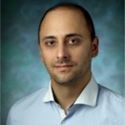
Thomaz Fleury Curado, MD, PhD, a Predoctoral and Postdoctoral Research Fellow 2015-2021; Supported by an American Heart Association Postdoctoral Fellowship, grant 16POST31000017 ‘Chemogenetic approach to obstructive sleep apnea, American Thoracic Society Unrestricted Award and by an American Heart Association Career Development Award 19CDA34660245 ‘Chemogenetic Approach to Treat Obstructive Sleep Apnea’ (04/01/2019-03/31/2022). Currently an Assistant Professor of Otolaryngology, Case Western Reserve.

Yaroslav (Slava) Berger, PhD, a Postdoctoral Research Fellow 2016-2019. Currently a Lecturer at Technion, Haifa, Israel.

Marcela Vieira, MD, a Research Assistant 2016-2018. Currently Medical Director – Gastroenterology, Clario, Cleveland OH.

Chenjuan Gu, MD, a Postdoctoral Fellow 2018-2021; Supported by Association Postdoctoral Fellowship Award 20POST35210763 ‘Effect of dinner timing on nocturnal glucose and lipid metabolism’. Currently a Clinical Research Physician FLP Associate at GSK R&D, Shanghai, China.

Lenise Kim, PhD, a Postdoctoral Fellow 2018-2024; Supported by Fundação de Amparo à Pesquisa do Estado de São Paulo (FAPESP), Brazil and by an American Heart Association Postdoctoral Fellowship Award 828142 ‘Role of leptin-TRPM7 signaling in carotid bodies in the pathogenesis of sleep-disordered breathing in obesity’. Currently a Principal Scientist at Apnimed, Inc.

Carla Freire de Castro Lima, MD, PhD, a Predoctoral and Postdoctoral Fellow 2018-2022; Supported by Conselho Nacional de Desenvolvimento Científico e Tecnológico (CNPQ), Brazil and by an American Heart Association Postdoctoral Fellowship Award 827943 ‘Role of sleep disordered breathing with leptin loaded exosomes’ (07/01/2021-06/30/2023). Currently a Consultant at Boston Consulting Group (BCG).

O Aung, BS, a Post-Baccalaureate Student 2021-2023; Supported by JHU Doctoral Diversity Program. Currently a medical student at the Medical College of Wisconsin.

Michele Singer, PhD, a Postdoctoral Fellow 2022-2024; Supported by T32HL110952 Multi-Institutional Training in Genetic/Genomic Approaches to Sleep Disorders.